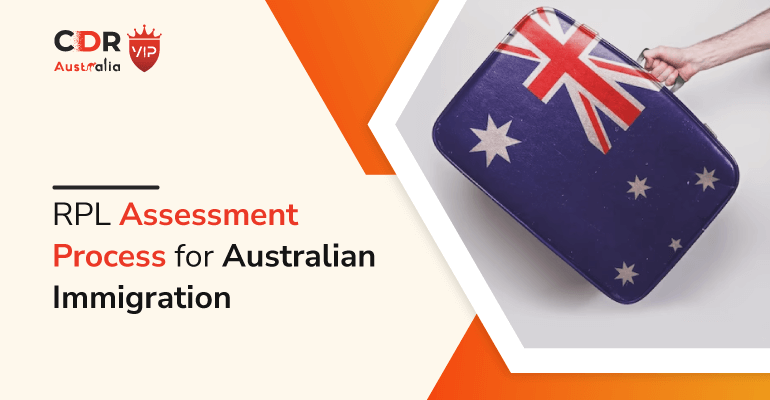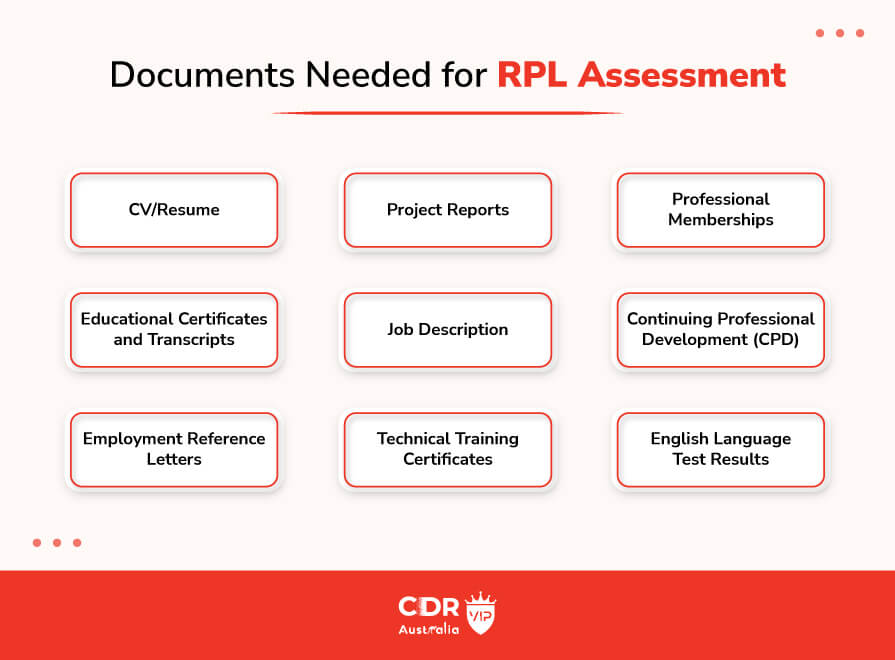RPL Assessment Process for Australian Immigration

RPL Assessment Process for Australian Immigration
Australia is one of the most preferred destinations for skilled immigrants across the globe. However, getting an Australian Skilled Migration visa is a challenging task. The Department of Home Affairs (DHA) has set specific criteria that every applicant needs to meet to be eligible for access.
One of these criteria is having the necessary educational qualifications and work experience in the relevant field. But what if an applicant has gained the necessary skills and knowledge through work or other means without having formal qualifications? This situation is where the Recognition of Prior Learning (RPL) assessment comes into play.
The RPL assessment is a process that recognizes the skills and experience of ICT professionals who need formal qualifications. The Australian Computer Society (ACS) is the designated authority that assesses the skills and qualifications of ICT professionals who wish to migrate to Australia.
The ACS recognizes that formal qualifications are not the only way to gain knowledge and skills and that individuals who have gained experience through work or other means can demonstrate their knowledge and skills through RPL assessment. This blog will discuss the RPL assessment process for Australia Immigration, including its categories, requirements, benefits, and costs.
RPL Assessment Process for Australia Immigration
The RPL assessment process for Australia immigration evaluates the skills and knowledge of ICT professionals. Mainly, it implies to those candidates who do not have formal qualifications equivalent to an Australian ICT degree.
The RPL assessment comprises the Key Areas of Knowledge (KAoK) and the Project Report. The KAoK lists topics related to the applicant’s work experience and skills. The applicant must demonstrate their knowledge and skills by providing evidence of their work experience and achievements.
The Project Report is a detailed description of a project that the applicant has worked on. The report should provide information about the project’s objectives, scope, methodology, and outcomes. The applicant must demonstrate their role in the project and their contribution to its success.
It is important to note that the RPL assessment is not a shortcut to getting an Australian Skilled Migration visa. The rigorous assessment process requires applicants to provide evidence of their skills and knowledge.
The ACS assesses each application on a case-by-case basis, and the assessment outcome depends on the applicant’s ability to demonstrate their skills and knowledge.
The ACS website provides detailed information about the assessment process, including the KAoK and Project Report requirements. There are also online forums and communities where applicants can connect with others who have completed the assessment process and share their experiences and tips.
The RPL assessment process for Australian immigration is applicable to various types of visa applications, including employer-sponsored, Engineers Australia, migration agent, holiday visas, and other Australian visa categories.
The process recognizes the skills and experience of ICT professionals who do not hold formal qualifications but can demonstrate their knowledge and skills through the RPL assessment.
The RPL assessment requires the submission of various documents, including a CV/resume, educational certificates, employment reference letters, project reports, job descriptions, technical training certificates, professional memberships, continuing professional development, and English language test results.
Employers can sponsor their employees for RPL assessment as part of their visa application. Engineers Australia also provides an RPL assessment process for engineers seeking to migrate to Australia. It is advisable to seek the services of a migration agent to help navigate the RPL assessment process and ensure that all visa requirements are met.
Must Read: How to get maximum points in Australian Immigration Process for Engineers? 📚📚
Two ACS RPL Assessment Categories
The ACS RPL assessment process for Australian immigration has two categories: the first is specified Credit for formal learning, and the second is unspecified Credit for formal education.
1. Specified Credit for formal learning
The specified Credit for the formal learning category is for individuals who have completed a qualification that is not ICT-related but has some ICT content. This category allows individuals to receive Credit for the ICT content of their qualification relevant to the ANZSCO code of discipline, along with professional experience of at least six years in this field of ICT.
2. Unspecified Credit for formal learning
The unspecified Credit for the formal learning category is for individuals who have completed a qualification related to ICT and have ICT content. This category allows individuals to demonstrate their ICT skills and knowledge through other means, such as work experience or professional development.
Applicants must have added two years of experience in the ICT field and, in total, eight years of experience where those two years of knowledge need to be outside the means relevant to the ANZSCO code.
ACS RPL Skills Assessment Requirements
The ACS RPL assessment process for Australian immigration has specific requirements that must get met. These requirements include the following:
- The applicant must have at least six years of relevant work experience in the ICT field.
- The work experience or ICT support and test needs to get gained within the last ten years.
- The applicant must demonstrate their ICT skills and knowledge through work experience, professional development, or other means.
- The applicant must provide evidence of their work experience, such as employment contracts, payslips, or reference letters.
Benefits of RPL Assessment
The RPL assessment process has several benefits, including helping individuals to obtain Australian visas in various subclasses, such as student visas, employer-sponsored visas, and graduate visas.
Through RPL assessment, individuals can demonstrate their skills and knowledge gained through their work experience or other means, even if they do not hold formal qualifications.
The project report form is a key document that helps individuals to showcase their skills and experience in their chosen field. This process can also lead to faster visa processing times and reduce the need for additional qualifications or training.
Overall, RPL assessment can open up opportunities for individuals seeking to migrate to Australia, regardless of their educational background.
The RPL assessment process for Australian immigration has several benefits for ICT professionals who do not have formal qualifications. These benefits include the following:
- It allows individuals to demonstrate their ICT skills and knowledge through work experience or other means.
- It provides a pathway for ICT professionals who need formal qualifications to migrate to Australia.
- It recognizes the value of knowledge and skills gained through work.
- It is a flexible and accessible assessment process that is open to individuals from a range of backgrounds.
Documents Needed for RPL Assessment
The Recognition of Prior Learning (RPL) assessment process for the Australian Computer Society (ACS) migration skills assessment is a rigorous process that requires submitting various documents to prove an applicant’s skills, knowledge, and experience.
The documents that applicants submit depend on their educational background, work experience, and the type of assessment they seek. Here are some of the essential documents that an applicant must submit for the RPL assessment:

1. CV/Resume
A detailed and updated CV or resume highlighting the applicant’s work experience, educational qualifications, and skills.
2. Educational Certificates and Transcripts
The applicant must provide all academic certificates and transcripts to prove their qualifications. The certificates should be certified and translated into English by an accredited translator.
3. Employment Reference Letters
Applicants must submit reference letters from their previous employers. The reference letter should include the applicant’s job title, duties, period of employment, and the employer’s contact details.
4. Project Reports
The applicant must provide project reports to showcase their experience in the ICT field. The information should detail the applicant’s role, responsibilities, and achievements in the project in the Career episode.
5. Job Description
A detailed job description outlining the applicant’s role, duties, and responsibilities.
6. Technical Training Certificates
Any technical training courses or certifications the applicant has completed should be submitted.
7. Professional Memberships
The applicant must provide evidence of their professional memberships in any relevant ICT organizations.
8. Continuing Professional Development (CPD)
The applicant should provide details of any continuing professional development (CPD) courses or training they have undertaken to improve their skills and knowledge.
9. English Language Test Results
The applicant must provide evidence of their proficiency in a recognized English language test such as IELTS or PTE.
It is crucial to note that the above list needs to get completed, and additional documents may be required depending on the applicant’s specific circumstances. It gets recommended that applicants thoroughly review the ACS guidelines and requirements for the RPL assessment process and seek professional advice if needed.
Must Read: How to write the perfect employment reference letter for the ACS RPL Report? 📚📚
Credit for Nonformal Learning and Informal Learning
Learning occurs outside of formal educational settings, such as through professional development courses or on-the-job training. Informal learning occurs through everyday activities like reading or online community participation.
The ACS RPL assessment process recognizes the value of nonformal and informal learning and allows individuals to receive credit for their skills and knowledge gained. The ACS RPL assessment process for Australian immigration also recognizes the value of nonformal and informal learning.
RPL Assessment Costs
The cost of the RPL assessment process for Australian immigration varies depending on the category and the number of skills getting assessed. The specified Credit for the formal learning category costs AUD 500 per skill, while the unspecified Credit for the standard learning category costs AUD 1,000 per skill.
Additional skills can get assessed for an additional fee. It is important to note that these fees are subject to change, and individuals should check the ACS website for the most up-to-date information.
RPL Assessment Processing Time
The processing time for the RPL assessment process for Australian immigration varies depending on the complexity of the assessment and the number of skills getting assessed. The ACS provides an estimated processing time of 12 weeks for the RPL assessment process. However, this processing time can be longer if additional information or clarification is needed.
Why Choose CDRAustraliaVIP?
CDRAustraliaVIP is a leading provider of RPL assessment services for Australian immigration. The company has a team of experienced and knowledgeable assessors who can provide individuals with a comprehensive and accurate assessment of their ICT skills and knowledge.
We have a strong track record of success, with many individuals migrating to Australia through the RPL assessment process. The company also provides affordable and transparent pricing without hidden fees or charges. Additionally, It offers personalized support for individuals throughout the RPL assessment process, ensuring they have the information and guidance they need to succeed.
Read more: Four ACS Assessment Pathways for Skilled Migration 💼💼
Conclusion
In conclusion, the RPL skills assessment is vital for Information and Communication Technology (ICT) professionals who need more formal qualifications and wish to migrate to Australia.
It has specific requirements and costs but provides numerous benefits, including recognizing the value of work experience and skills gained through other means. The ACS RPL assessment process is flexible and accessible, allowing individuals to showcase their ICT skills and knowledge.
CDRAustraliaVIP is a leading provider of RPL assessment services and can assist individuals seeking to undertake the assessment process. Their personalized support and guidance help individuals navigate the assessment process and increase their chances of success.
With their expertise and experience, individuals can rest assured that they will receive a high-quality assessment that meets the Australian Computer Society (ACS) requirements.

